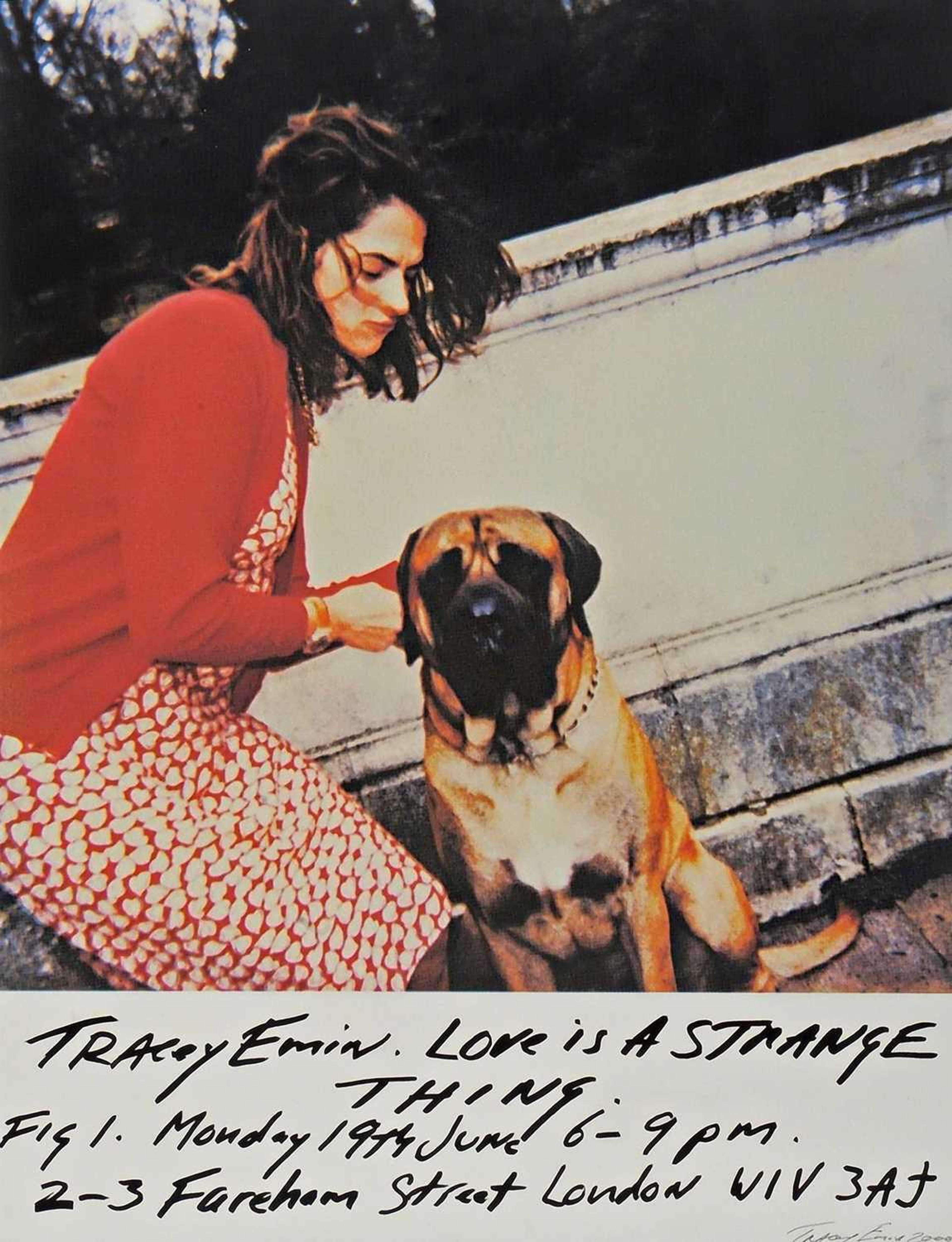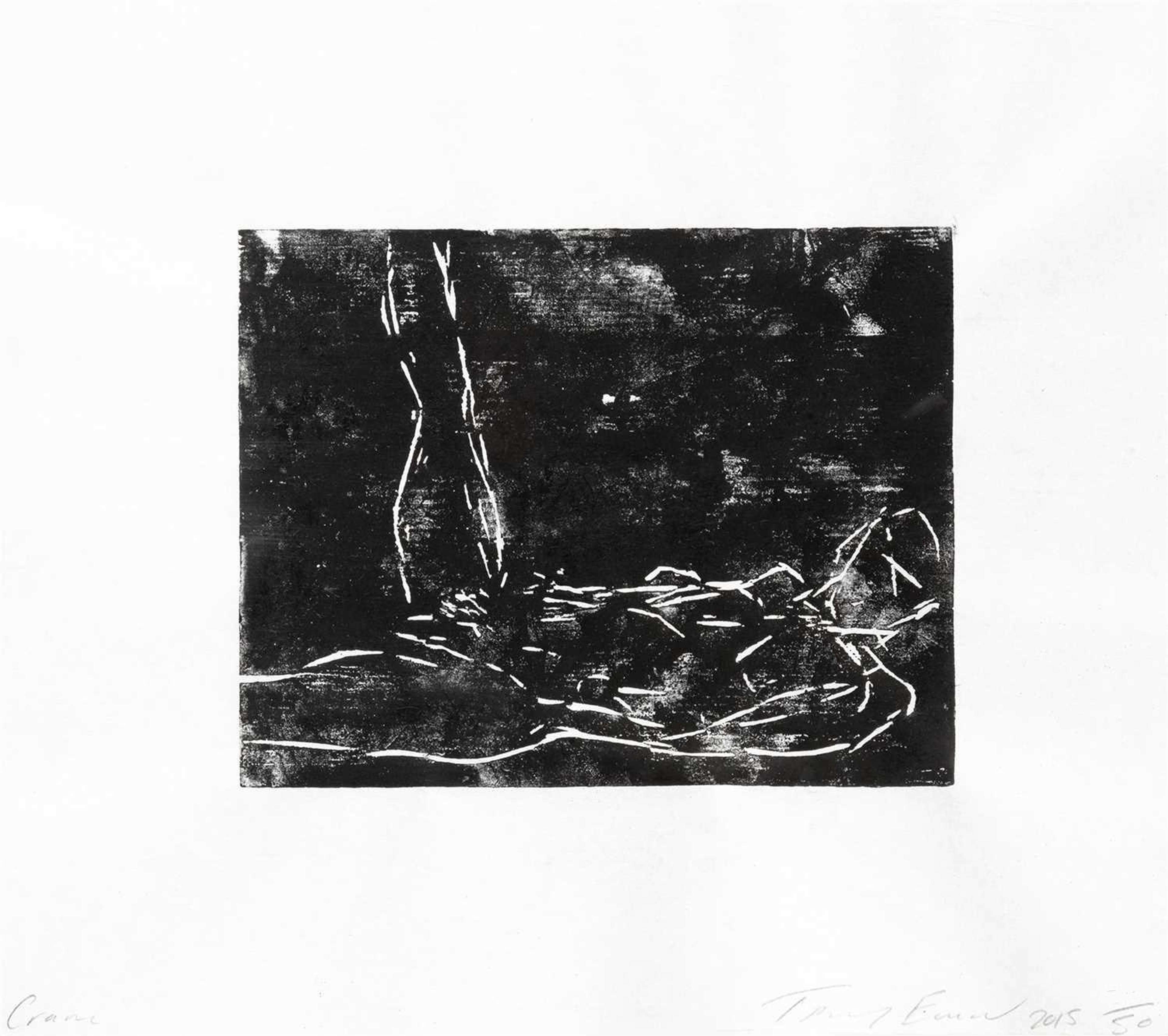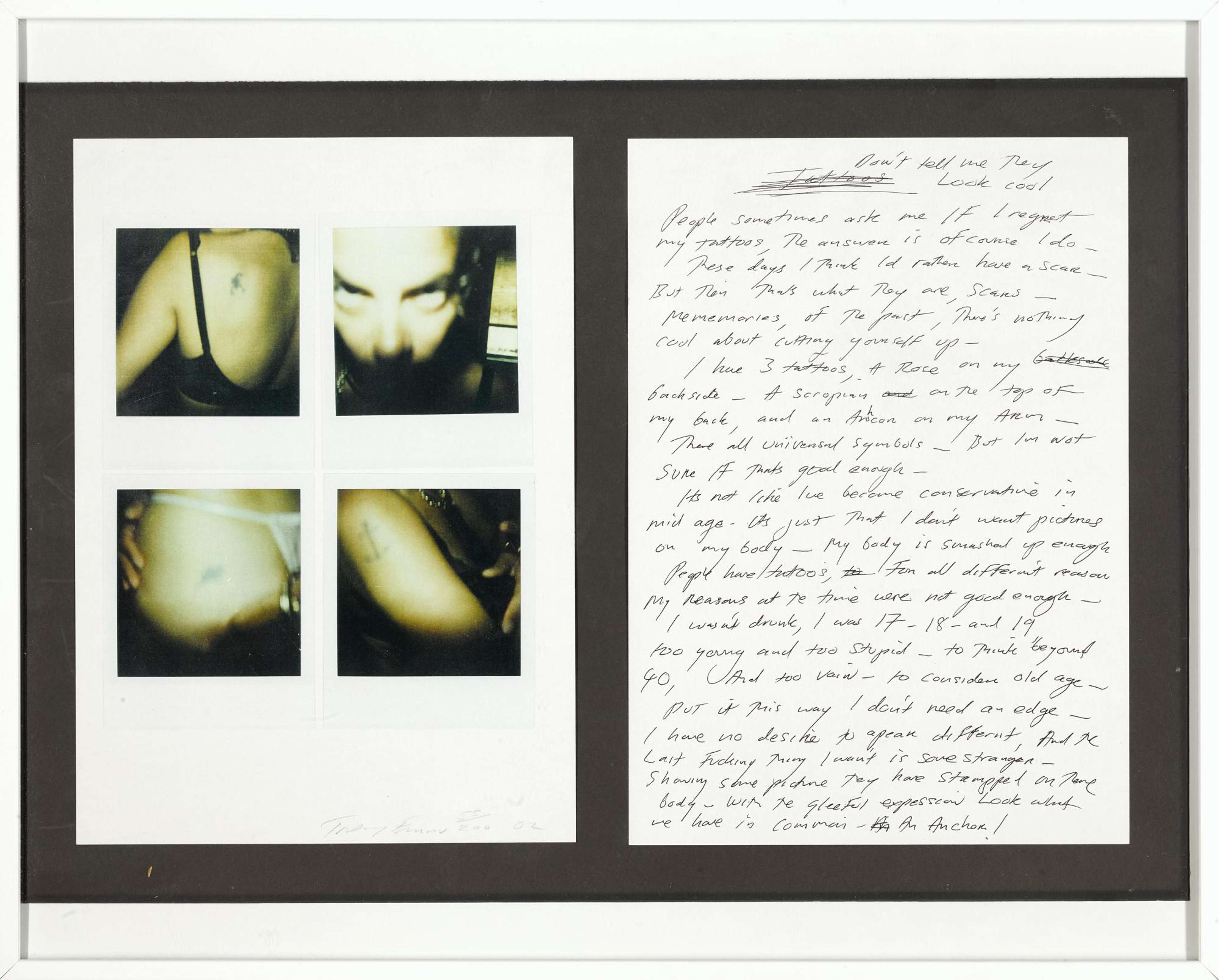Tracey Emin: Exploring Autobiography and Femininity in Modern Art

 Love Is A Strange Thing © Tracey Emin 2000
Love Is A Strange Thing © Tracey Emin 2000
Tracey Emin
143 works
Tracey Emin, a leading figure in British art, is known for her raw, emotive creations across various mediums, including painting, sculpture, and photography. A prominent member of the Young British Artists (YBAs), she gained acclaim in the late 1980s and 1990s for her provocative, autobiographical work. Emin's art provides a candid glimpse into her personal experiences and emotions, establishing her as a bold and unapologetic voice in the contemporary art world.
 Image © Tate Modern / My Bed © Tracey Emin 1998
Image © Tate Modern / My Bed © Tracey Emin 1998Is Tracey Emin a Feminist Artist?
Emin's career can be likened to an open diary, revealing personal details steeped in deep emotion and intimate experience. This candid approach has often raised the question: Is Tracey Emin a feminist artist? Emin herself has navigated this query with a nuanced perspective. She doesn't explicitly label herself as a feminist artist, yet her work undeniably resonates with core feminist themes – the exploration of female sexuality, the candid portrayal of emotional vulnerability, and the defiance against patriarchal narratives.
Emin's My Bed, a seminal work, is a stark, unfiltered snapshot of a woman's life, portraying vulnerability and strength simultaneously. In this light, Emin’s art can be seen as a form of feminist expression, one that defies conventional categorisation and emphasises personal truth over collective labels. She blends her individual experiences into a broader concept of female existence, offering a complex, multifaceted view of what it means to be a woman and an artist in today’s society.
 Image © White Cube / We Died Again © Tracey Emin 2023
Image © White Cube / We Died Again © Tracey Emin 2023 Autobiography in Tracey Emin's artwork
Emin's creations, often autobiographical in nature, offer a glimpse into her innermost thoughts and experiences. Through mediums such as installations, sculptures, and paintings, she confronts issues of sexuality, trauma, and empowerment. Her candid exploration of these themes resonates with audiences around the globe, sparking conversations and provoking introspection.
Emin's art is deeply rooted in her personal narrative. She fearlessly exposes her vulnerabilities and lays bare her emotions, creating a powerful connection with viewers. Whether it's her famous installation My Bed, or her neon artworks featuring phrases from her own diary, Emin's autobiographical approach allows her to express herself authentically while also inviting others to reflect on their own experiences.
Through her compositions, Emin challenges the notion that the personal should be kept private. She encourages a cultural shift towards embracing and celebrating personal narratives, breaking down the barriers of shame and taboo. By sharing her own story, Emin empowers others to do the same, creating a sense of community and solidarity among those who have felt silenced.
Autobiography is not just a means of self-expression for Emin; it is also a way to reclaim her own narrative and challenge the patriarchal structures that seek to define and control women. By showcasing her own experiences, she disrupts traditional notions of femininity and reclaims her sense of agency. Simply put, Emin asserts that women have the right to be both vulnerable and powerful, complex and contradictory.
 Image © White Cube / But You Never Wanted Me © Tracey Emin 2018
Image © White Cube / But You Never Wanted Me © Tracey Emin 2018Femininity and gender in Tracey Emin's artwork
In many of her artworks, Emin presents the female body as a site of power, desire, and vulnerability. Her self-portraits, for example, capture her body in various states, often in provocative and unapologetic poses. By embracing her own sexuality, Emin challenges the male gaze and reclaims the female body as a subject worthy of celebration and exploration.
Emin's exploration of femininity goes beyond the physical body. She also examines the emotional and psychological aspects of being a woman. In her art, she tackles themes such as love, heartbreak, and longing, giving voice to the often complex and contradictory emotions experienced by women. By doing so, she challenges the notion that femininity is one-dimensional or easily defined.
Gender is another key theme in Emin's artwork. She questions the binary understanding of gender and explores the fluidity and complexity of gender identity. Through her autobiographical approach, she opens up conversations about non-conformity, encouraging viewers to reconsider their idea of body politics.
The use of personal experiences in Tracey Emin's art
Emin draws inspiration from her own life, transforming her emotions, memories, and traumas into powerful visual narratives. By sharing her personal stories, she invites viewers to connect with her on a deeply emotional level, creating a sense of intimacy and empathy.
Emin's use of personal experiences is not limited to her choice of subjects. She also incorporates personal objects and materials into her artwork, further blurring the line between art and life. For example, in her installation Everyone I Have Ever Slept With 1963-1995, she displayed a tent embroidered with the names of everyone she had ever shared a bed with. By using objects and materials that have personal significance to her, Emin adds layers of authenticity and depth to her artwork.
Through her personal storytelling, Emin challenges the notion of the artist as an objective observer. Instead, she positions herself as an active participant in her own art, blurring the boundaries between the artist and the artwork. By doing so, she challenges the traditional conventions of art-making and invites viewers to reflect on their own agency and role in shaping their narratives.
 Image © Hang-Up Gallery / You Held My Face © Tracey Emin 2018
Image © Hang-Up Gallery / You Held My Face © Tracey Emin 2018The impact of Tracey Emin's art on the art world
Emin's unique blend of autobiography and feminism has sparked conversations and provoked introspection among artists, critics, and viewers alike. Her fearless approach to addressing contemporary subjects and her unapologetic portrayal of female experiences have opened up new avenues for artistic expression. Through her art, she has reconstructed the idea that art should be detached and aloof, inviting a more personal and emotionally-driven approach. This has paved the way for a new generation of artists who are unafraid to delve into their own stories and experiences.
Emin's impact extends beyond the art world. Her artwork has resonated with audiences around the globe, sparking conversations about feminism, gender, and identity. By presenting her own experiences in a universal and relatable way, she has empowered individuals to embrace their own stories and voices, challenging the patriarchal structures that seek to silence them.
Tracey Emin and Postmodernism
Emin’s works often challenge traditional aesthetics and moral sensibilities. This is quintessential postmodernism–a rejection of the pristine and the idealised in favour of the fragmented and the real. However, Emin's approach diverges from the cold, often impersonal detachment of postmodernism. While embodying postmodern traits like self-reflexivity and the deconstruction of authorship, Emin's work also harks back to more traditional forms of storytelling and emotional expression. In this sense, her oeuvre is a confluence of the postmodern ethos and a deeper, more primal artistic impulse, making her a unique voice in the modern art narrative.
The controversy surrounding Tracey Emin's work
Emin's artwork has not been without controversy. Her unfiltered approach to art-making has divided opinions and sparked heated debates among critics and viewers.
One of the main sources of controversy surrounding Emin's work is her use of experiences. Some argue that her art is too self-indulgent and lacks a broader social or political message. Others find her candid approach refreshing and empowering, celebrating her ability to bring personal stories to the forefront.
Emin's exploration of sexuality and the female body has also been a source of controversy. Some argue that her portrayal of the female body is too explicit and vulgar, perpetuating harmful stereotypes. Others see her art as a powerful reclamation of the female body, challenging the male gaze and celebrating female desire.
Tracey Emin's evolution as an artist
Emin's journey has been one of evolution and growth. Over the years, she has continuously pushed the boundaries of her art, experimenting with new mediums and approaches.
Emin's early works gained attention for their raw and confessional nature. Her exploration of her own sexuality, trauma, and vulnerability captivated audiences and established her as a significant figure in contemporary art. As her career progressed, she began to incorporate more diverse mediums into her artwork, including sculptures, textiles, and neon lights.
In recent years, Emin's art has taken on a more reflective and introspective tone. She has continued to venture into her own personal history, exploring themes of family, love, and loss. Her art has become more contemplative, inviting viewers to reflect on their own experiences and emotions.
 Image © White Cube / Only Room In My Mind For You © Tracey Emin 2020
Image © White Cube / Only Room In My Mind For You © Tracey Emin 2020Influences on Tracey Emin's artwork
Emin's artwork is shaped by a variety of influences, from her own personal experiences to the broader cultural and artistic landscape. One of the key influences on Emin's art is her own personal history. Her traumatic childhood and experiences of abuse have had a profound impact on her artwork. Through her art, she confronts these painful memories, reclaiming her own narrative and challenging the silence and shame that often accompanies such experiences.
Emin is also influenced by the feminist art movement, particularly the work of artists such as Judy Chicago and Louise Bourgeois. Emin's connection to Bourgeois is apparent in her introspective approach and the use of personal history as a primary source of artistic inspiration. Bourgeois’ exploration of themes like motherhood, pain, and the female body in her bronze and fabric sculptures provides a conceptual framework that Emin adapts in her own narrative-driven pieces.
Recent years have marked a profound shift in Emin’s work, influenced by her personal battle with cancer and her recovery. She has spoken about how this experience has brought a new depth of introspection and urgency to her creations. Her recent pieces often reflect themes of mortality, resilience, and transformation, exploring the fragility of life and the strength found in survival. These themes are explored in her 2024 solo exhibition, I followed you to the end, an intimate dive into Emin's ability to turn personal challenges into universal expressions of human vulnerability and empowerment.
 Image © White Cube / WET © Tracey Emin 2021
Image © White Cube / WET © Tracey Emin 2021Tracey Emin's legacy and significance in modern art
Emin's legacy extends far beyond her own artwork. She has inspired a new generation of artists to be fearless in their expression, to embrace vulnerability, and to challenge the limitations placed on women in the art world and society at large. Her art has sparked conversations, provoked introspection, and empowered individuals to embrace their own narratives and identities.
In the captivating world of Emin, vulnerability meets strength, and the personal becomes political. Through her unique blend of autobiography and feminism, she has created a space for marginalised voices to be heard, for personal stories to be shared, and for the complexities of female identity to be celebrated.









